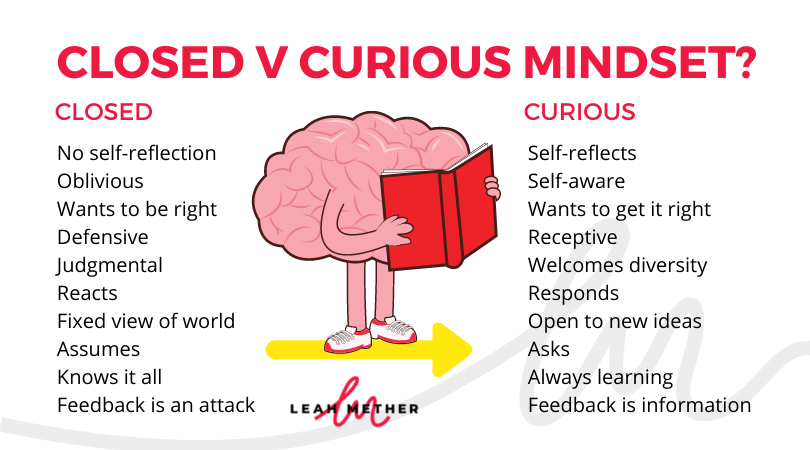What sort of mindset do you have – closed or curious?

In these ever-changing times, we are being continually challenged to consider new ideas, information, and ways of working.
Adopting a curious mindset is key to unlocking effective communication, personal growth and leadership under this pressure.
It’s one of the most important ‘soft’ or ‘human’ skills to develop.
When we’re curious we’re open to learning and new ideas. We’re focussed on continuous improvement and getting the best outcome rather than ‘being right’. We are receptive to change.
A curious communicator asks great questions, seeks to understand other perspectives and where someone is coming from (even if we disagree with them), and welcomes diversity of opinion.
This helps us respond calmly rather than react emotionally under pressure. We get curious, not furious.
Let me be clear though: Curiosity doesn’t mean we have to give all opinions equal weighting or air time; reach consensus on every decision; or be open to perspectives that are discriminatory, dangerous, ill-informed or racist. Not at all. But what it does mean is that we get curious about how a person came to that perspective in the first place. What informs their belief and why?
Used this way, curiosity is a foundation of empathy.
When we turn our curiosity inwards onto our own behaviour, thoughts, and actions, we self-reflect with openness and honesty. Rather than beat ourselves up for what went wrong, we look for the learnings and what we could do differently next time.
If we think about how we’re perceived by others with curiosity rather than defensiveness and self-loathing, we are open to feedback and increase our self-awareness.
But curiosity can be hard. When we feel threatened or under pressure it’s easy to adopt a closed mindset without even realising it. Our defences go up and we’re on guard against perceived attacks.
We react based on assumptions, often without knowing the full picture. We don’t listen and we interject without considering what the other person is saying. Our only focus is getting our own point across and differing opinions are dismissed or judged harshly.
With a closed mindset, we have a fixed view of how things are done and resist change or anything new.
This armoured response makes the ability to self-reflect almost impossible. Other people are the problem, not us.
Curiosity takes courage. It requires vulnerability and a willingness to admit we don’t know it all or have all the answers.
It also requires psychological safety. It’s much harder to be curious in an environment where you are belittled for asking questions, punished for making mistakes, or shamed for not having (or pretending to have) all the answers.
So how can we be more curious and how, as leaders, can we foster an environment in the workplace that encourages curiosity? Here are some tips:
How can we be more curious?
How can you create a team environment that encourages curiosity?
Curiosity takes practice and the more you do it the better you get.
What can you do to get curious today? I’d love to hear your ideas.
Leah Mether helps people get out of their own way with the development of soft skills (which are really hard). She is a speaker, trainer, facilitator, mentor and author of the book Soft is the New Hard: How to Communicate Effectively Under Pressure.

Leah Mether is a communication and soft skills trainer obsessed with making the people part of leadership and work life easier.
With more than 15 years’ experience working with thousands of clients, and an acclaimed book to her name, Leah knows what it takes to communicate under pressure. Like you, she knows the challenge of conflict, personality clashes, and difficult conversations.
Leah is renowned for her practical, engaging, straight-shooting style. Utilising her Five Cs® model of communication, she helps leaders and teams shift from knowing to doing, and radically improve their effectiveness.